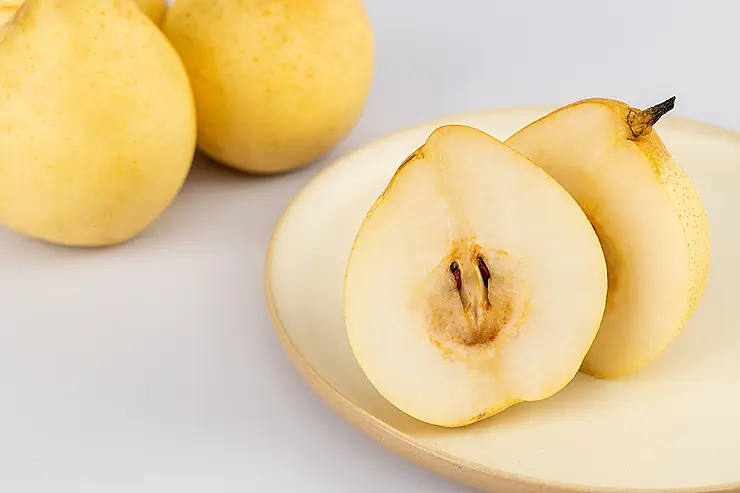Pears, with their juicy and succulent flesh, have been cherished for centuries not only for their delightful taste but also for their numerous health benefits.
These delectable fruits are packed with essential nutrients, dietary fiber, and antioxidants, making them a valuable addition to a well-rounded and health-conscious diet. Let’s embark on a journey to unravel the nutritional brilliance and useful properties of pears.
1. Nutrient-Rich Powerhouses: Pears, whether red, green, or brown, are a rich source of essential vitamins and minerals. They contain vitamin C, an antioxidant that supports the immune system, and vitamin K, which plays a vital role in blood clotting and bone health. Additionally, pears provide small amounts of other essential vitamins like B-complex vitamins, including folate.
2. Dietary Fiber for Digestive Health: One of the standout features of pears is their impressive fiber content. Fiber is essential for digestive health, and pears offer a combination of soluble and insoluble fiber. Soluble fiber helps regulate blood sugar levels and lower cholesterol, while insoluble fiber adds bulk to the stool, promoting regular bowel movements and preventing constipation. Consuming pears can contribute significantly to achieving and maintaining a healthy digestive system.
3. Antioxidant Protection: Pears are loaded with antioxidants, including flavonoids and carotenoids. These antioxidants play a crucial role in neutralizing free radicals in the body, which can help reduce oxidative stress and inflammation. Antioxidants contribute to overall cellular health and are associated with a lower risk of chronic diseases, including heart disease and certain cancers.
4. Heart Health Benefits: The fiber, potassium, and antioxidants found in pears collectively contribute to heart health. Dietary fiber helps regulate cholesterol levels, while potassium supports healthy blood pressure. The combination of these factors makes pears an excellent choice for promoting cardiovascular well-being. Including pears in a heart-healthy diet may contribute to a reduced risk of heart disease.

5. Blood Sugar Regulation: The fiber content in pears also plays a role in managing blood sugar levels. The soluble fiber in pears slows down the digestion and absorption of sugars, helping to prevent rapid spikes and crashes in blood glucose. This makes pears a suitable option for individuals with diabetes or those looking to manage their blood sugar levels effectively.
6. Weight Management Ally: Pears can be a valuable asset for those aiming to achieve or maintain a healthy weight. The high water content and fiber in pears contribute to a feeling of fullness, potentially reducing overall calorie intake. Choosing nutrient-dense, low-calorie foods like pears as snacks or additions to meals can support weight management goals.
7. Hydration Support: With their water content exceeding 80%, pears contribute to daily hydration needs. Staying adequately hydrated is essential for various bodily functions, including temperature regulation, nutrient transportation, and overall cellular activity. Including hydrating fruits like pears in your diet can complement your fluid intake and promote overall well-being.
8. Skin-Nourishing Properties: The antioxidants in pears play a role in promoting skin health. These compounds help combat oxidative stress, which is linked to premature aging and skin damage. Consuming pears as part of a balanced diet contributes to overall skin nourishment and may contribute to a radiant complexion.
9. Versatility in Culinary Applications: Beyond their nutritional benefits, pears are incredibly versatile in the kitchen. Whether enjoyed fresh, sliced in salads, added to oatmeal, or baked into desserts, pears bring a natural sweetness and unique flavor to a variety of dishes. Their culinary adaptability makes them a delightful and nutritious addition to a diverse range of recipes.
10. Incorporating Pears into Your Diet: Incorporating pears into your diet is both simple and delicious. Enjoy them as a standalone snack, add slices to yogurt or cereal, or include them in both sweet and savory dishes. Their natural sweetness can also be savored in juices, smoothies, and jams. With such culinary flexibility, it’s easy to make pears a regular and enjoyable part of your daily nutrition.
In conclusion, the useful properties of pears extend far beyond their delightful taste. Packed with nutrients, fiber, and antioxidants, pears offer a plethora of health benefits, from supporting digestive and heart health to contributing to radiant skin. Including this versatile fruit in your diet is a flavorful and nutritious way to enhance your overall well-being.
So, why not indulge in the nutritional brilliance of pears and let their wholesome goodness enrich your health journey?



